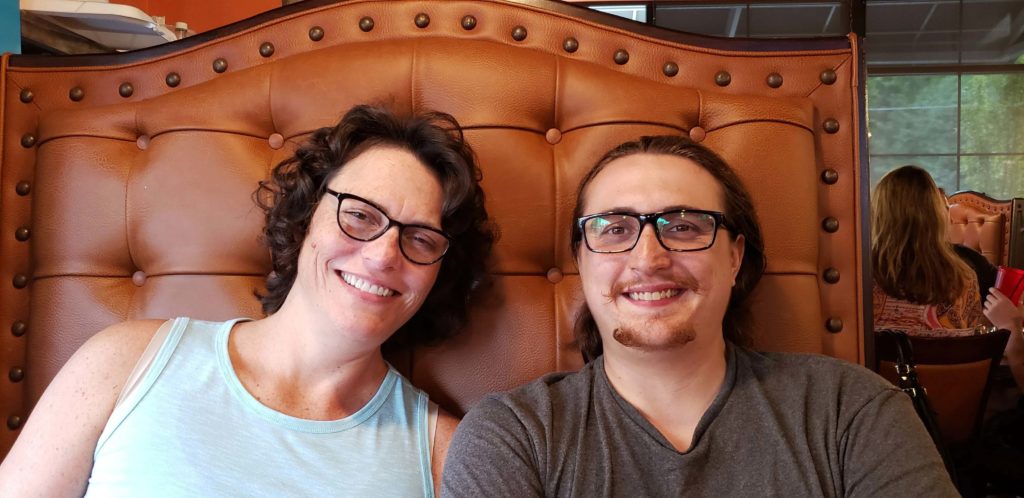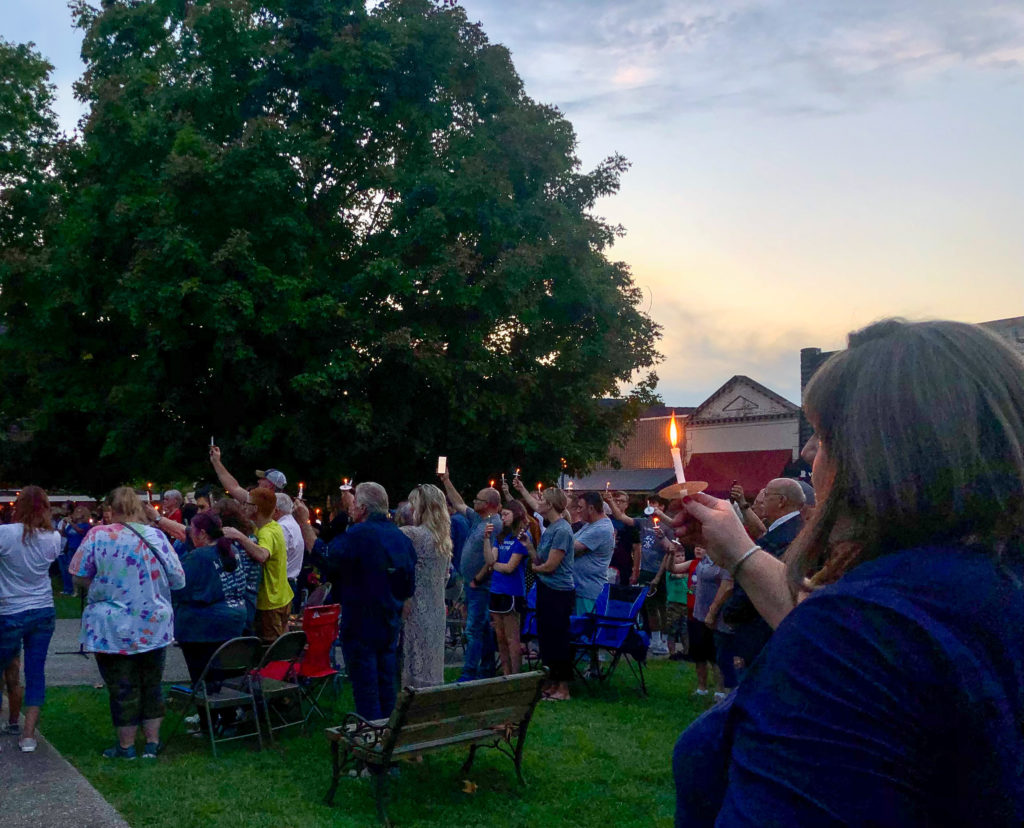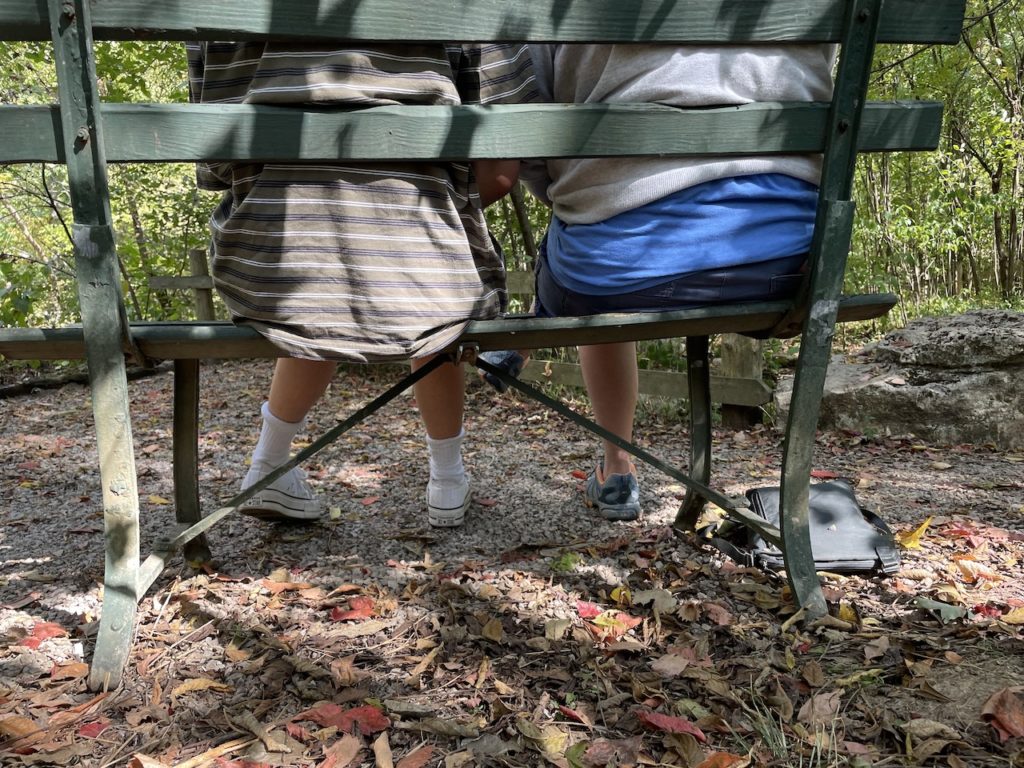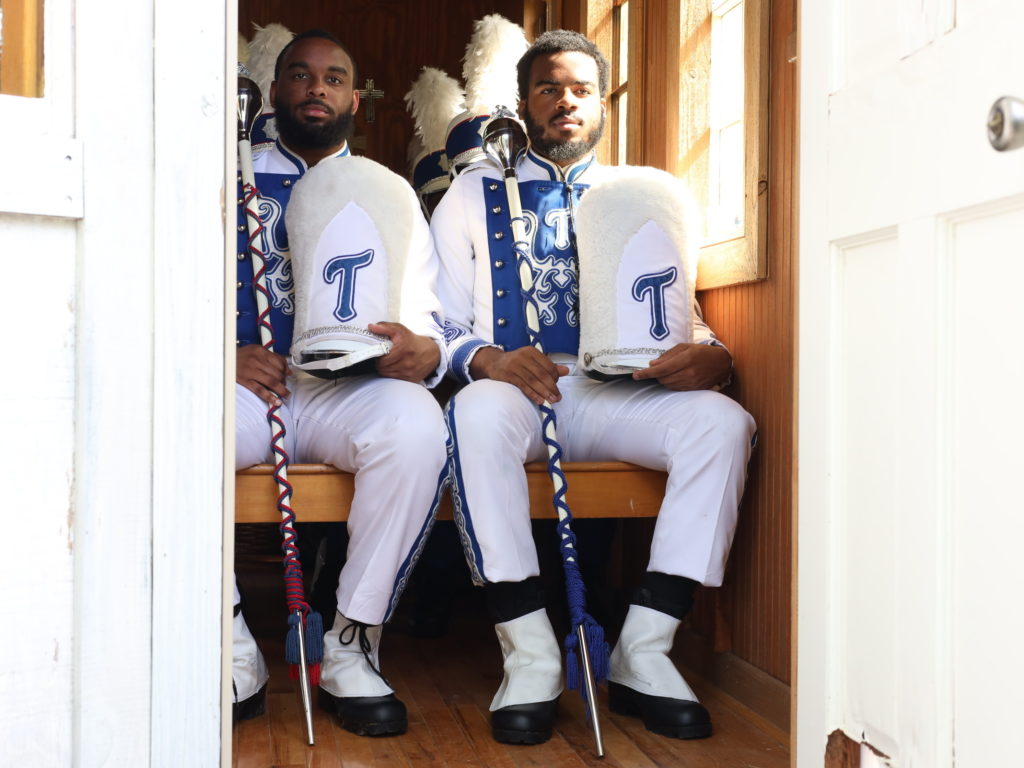
WPLN News publishes about 1,500 stories each year, on everything from beagle rescues to natural disasters. With so much going on each day, it can be easy to lose sight of the major themes.
Communities pulling together. People are working to solve complex problems. How the decisions made by government agencies affect our lives.
So as 2022 draws to a close, we’d like to step back and talk about some of the big storylines of the year — issues that we tried to help our listeners and readers understand better. We’re committed staying with these stories in 2023 and help Middle Tennessee find answers to some of the challenges facing us.
— Chas Sisk, senior editor & interim news director

Police shootings
The causes of police shootings are complex. Racism, training and the rising number of guns have all been cited — and debated — as possible factors.
Regardless of the cause, when authorities take the lives of citizens, it’s tragic. Both for the people who are killed and for the officers who afterward must reconcile the decision to pull the trigger with their oath to protect and defend.
No issue requires more scrutiny than killings by police, and Nashville officers fired fatal shots 10 times in 2021. In 2022, we took seriously our duty to continue examining these cases. These stories show our efforts to bring Middle Tennesseans the facts — and then come back with questions about how to keep interactions from turning deadly.
More: ‘He was crying out for help’: Landon Eastep’s widow questions law enforcement after 9 officers shot her husband on the side of a Nashville interstate (Samantha Max, Jan. 28)
More: Mental health clinicians often aren’t on the scene when police interactions turn deadly. Here’s why. (Samantha Max, Feb. 4)
More: The mental health variable in police interactions (This Is Nashville, July 18)
More: The fatal police shooting of a man named Chief may deepen the divide between the city and Nashvillians struggling with homelessness (Paige Pfleger, Nov. 16)

Waverly rebuilding
Twenty people lost their lives when flash flooding swept through Humphreys County in August 2021, but that’s only one way to measure the devastation. Schools and buildings were destroyed. Families were uprooted. Those who remained had to rebuild while in mourning.
One commitment we made as a newsroom in 2022 was to cover that rebuilding. From January to the one-year anniversary of the flood, we visited the community at least once a month to meet people there, share stories of their triumphs and remember the difficulties that remain.
Here are some of those stories:
More: A flood displaced the family behind Waverly’s only Chinese restaurant. Now, they’ll have to start over — again. (Juliana Kim, Jan. 13)
More: Waverly’s graduating seniors pay one last visit to the elementary school wiped out by record flood (Damon Mitchell, May 19)
More: Waverly’s flood recovery has a long way to go, and the deaths and departures make for an uncertain future (Damon Mitchell, Aug. 19)
More: A year later, Waverly remembers the 20 lives lost to flood (Caroline Eggers, Aug. 21)

Rethinking The Police Academy
What is a police department? Is it a paramilitary organization? Or is it a community organization?
How one thinks of the police can go a long way toward determining what a department becomes. Military training is meant to be stressful, with the goal of toughening up recruits for life-threatening situations and building camaraderie by putting them all through an ordeal. Other training models emphasize problem-solving and community relations — the idea being that police aren’t soldiers; they’re public servants.
In this three-part series, reporter Samantha Max explored the ramifications of each approach — and how those choices affect who does and does not become a police officer.
More: Nashville’s police department wants to diversify, but its training program has failed many women and people of color (Samantha Max, Feb. 9)
More: Why are many departments still using military-style training when research suggests it’s not the best option? (Samantha Max, Feb. 10)
More: As Nashville’s police academy grapples with high dropout rates, new leaders tone down the stress (Samantha Max, Feb. 11)

Climate
The effects of climate change have become more apparent in recent years in Tennessee. Though it’s not possible to say what caused any single event, the voracity of tornadoes, extremity of flash flooding and suddenness of weather swings are all likely the result of a warming planet.
Environmental reporter Caroline Eggers has been showing how Tennessee is dealing with this new reality — and suggesting where the state has been coming up short. Her critical coverage of the power industry and the state’s infrastructure has raised important questions about Tennessee’s future.
More: When dangerous weather strikes, most states rely on ‘mesonet’ infrastructure for better forecasts and earlier warnings. But Tennessee doesn’t have one. (Caroline Eggers, Feb. 24)
More: The latest UN climate report says stop burning fossil fuels. TVA has other plans. (Caroline Eggers, April 8)
More: EPA scrutiny, 1,600 pages and secret math: TVA’s quest for more natural gas (Caroline Eggers, Dec. 9)

Statehouse coverage
In recent years, WPLN has been one of a handful of media outlets to have a full-time reporter dedicated to covering the Tennessee General Assembly. Why? Few institutions have more power over your everyday life.
Whether it’s access to abortion or drug laws or insurance regulations, the decisions made by lawmakers matter. We chronicle those discussions as they happen, provide context and analysis, and step away periodically to collect the thoughts of Tennesseans about what’s happening.
This results in dozens of stories each year — too many to list here. But we can give you this summary by state political reporter Blaise Gainey and news editor Julia Ritchey.
More: At the Statehouse: Here’s everything the 2022 Tennessee Legislature did to your life (Blaise Gainey and Julia Ritchey, April 29)

Abortion in Tennessee
Speaking of abortion, 2022 was a milestone year in our nation’s history of reproductive rights. As expectations built this spring that the U.S. Supreme Court was preparing to strike down Roe v. Wade, our newsroom began to map out how this momentous change would affect Tennesseans.
Over the next several months, we told stories of people who had chosen abortion, including minors who had to go to the courts to get consent, and those who had made the choice not to have abortions. We broke down what the Dobbs decision would mean for Tennesseans — not only in terms of abortion but in terms of access to contraception. And we reported on the ramifications for sexual assault survivors and for medical providers.
The following stories span the breadth of our coverage.
More: Two sisters got pregnant young. The choices they made — and the secrets they kept — shaped their lives. (Paige Pfleger, June 6)
More: Explainer: How the Dobbs decision affects Tennesseans’ reproductive options (Chas Sisk, June 30)
More: Abortion medication goes underground in Tennessee (Nina Cardona, July 5)
More: Sexual assault prevention and resources for survivors in a post-Roe world (This Is Nashville, Aug. 10)
More: How doctors carry the greatest legal risk under Tennessee’s total abortion ban (Blake Farmer, Aug. 25)
More: We surveyed every state lawmaker on adding rape and incest exceptions to Tennessee’s abortion law. Only Democrats responded. (Blaise Gainey, Aug. 26)
More: For years, teens came to Nashville to ask for a judge’s permission to get abortions instead of telling their parents. That’s done, leaving ‘zero options.’ (Paige Pfleger, Aug. 30)
More: Looking at birth control access in Middle Tennessee (This Is Nashville, Aug. 31)

Riverchase
In 2022, we made a commitment to deepening our housing coverage. One way we did that was a three-part series on a single, prominent housing complex, Riverchase Apartments in East Nashville.
In the series, “Displaced,” Metro reporter Ambriehl Crutchfield explored how systemic neglect had allowed a private development that served low-income Nashvillians to sink into disrepair. It laid out the tensions that come when groups that intend to help residents have differing ideas how to do so. And it demonstrated the challenges that low-income residents face to find adequate housing.
Riverchase happened to be in a prominent location — just across the river from downtown Nashville and just outside the proposed zone of redevelopment on the East Bank. But there are similar stories happening all over Nashville, even amid its boom.
More: An affordable housing complex in East Nashville deteriorated in plain sight. Here’s how it happened. (Ambriehl Crutchfield, May 25)
More: Riverchase residents feel tension as community groups split on their demands of developer (Ambriehl Crutchfield, June 2)
More: For some at Riverchase, the search for housing remains a major challenge despite offers of help (Ambriehl Crutchfield, June 2)

Black male graduation rates
Black men are among the least likely to complete college, even when they enroll. That fact may not be surprising, but it’s not inevitable.
Earlier this year, reporter Damon Mitchell set out to find out why — and to see if there are steps that could be taken to produce better results. In a pair of stories, he lays out some of the challenges young Black men face, and how mentorship and peer support can improve outcomes.
More: Black males aren’t graduating with their peers from Tennessee colleges. What are the solutions? (Damon Mitchell, May 6)
More: Tennessee colleges are struggling to graduate Black males. Here’s how one university is making strides. (Damon Mitchell, Sept. 6)

Violence interruption
In the wake of the Black Lives Matter protests of 2020, Nashville Mayor John Cooper pledged to put city money in a public safety model that treats violence like a virus. Violence interruption calls for hiring people to serve as credible messengers who can defuse tensions.
Studies show that violence interruption can work. But two years later, the city is yet to have followed through on that promise to fund a full-fledged violence interruption program. That’s in part because questions have been raised about the leadership of the city’s most prominent violence interruption organization, Gideon’s Army.
Through the year, we have sought to illuminate what violence interruption is and encourage accountability.
More: Nashville is about to invest about $2M in a community-based public safety program. But some anti-violence groups say that’s not enough. (Samantha Max, March 24)
More: Keeping our communities safe (This Is Nashville, March 24)
More: Nashville’s mayor set aside millions for community members working to reduce violence. Where has that money gone? (Paige Pfleger, Oct. 26)
More: A partner in Nashville’s first violence interruption program pulls out, amid scrutiny of the city’s public safety funding efforts (Paige Pfleger, Nov. 1)

Trans rights
For the past several years, conservatives in Tennessee have sought to legislate what facilities transgender people can use and what sports they could play, but 2022 was the year in which they pivoted to attacking transgender rights and care outright.
The evolution of this debate can be seen in a pair of stories. In July, All Things Considered host Marianna Bacallao interviewed the family of a transgender teen about how anti-trans legislation led them to leave the state. Just three months later, health care reporter Blake Farmer spoke with a family that feared losing access to treatment entirely.
These stories show the real-world consequences of a debate that many would prefer to keep abstract.
More: ‘Tennessee broke my heart’: Why one mom who challenged the state’s anti-transgender law abandoned the suit and the state (Marianna Bacallao, July 6)
More: Parents of trans teens in Tennessee have their own concerns about rushing treatment, but they fear losing the option (Blake Farmer, Oct. 4)

Guns in cars
With remarkable regularity, Metro Nashville Police update the public on the number of guns that are stolen from vehicles. In 2021, the number exceeded 1,300.
Reporter Paige Pfleger wanted to know more about this phenomenon — and the impact that it has on people. What she found is that many of the thieves are minors, hoping to make money quickly by stealing an item with high street value.
Her attention to the issue raised awareness. But so far, it has not changed the trend. As of early December, even more guns had been stolen in 2022.
More: More than 1,300 guns were stolen out of cars in Nashville last year. Why does the problem keep getting worse? (Paige Pfleger, Jan. 18)
More: Nashville teens are ‘car hopping’ — trying unlocked car doors to see what they can find. Often, it’s guns. (Paige Pfleger, Feb. 4)
More: More guns have been stolen from cars in Nashville this year than any year on record (Paige Pfleger, Dec. 6)

West Tennessee oil spill
It’s hard to imagine the state’s second-largest oil spill ever could escape widespread notice. But, in fact, that’s exactly what happened this summer.
That is, until environmental reporter Caroline Eggers heard about it. Using public records, she was able to confirm that 200,000 gallons of crude oil had escaped a pipeline in West Tennessee. The oil made it into a creek and nearly into an important aquifer.
More: Tennessee just had its second-largest crude oil spill ever, with 200,000 gallons leaking into rural town (Caroline Eggers, July 5)
More: Tennessee’s second-largest crude oil spill narrowly missed the state’s biggest aquifer (Caroline Eggers, July 6)
More: Looking at the state of pipelines in Tennessee (This Is Nashville, July 15)
More: Tennessee’s massive oil spill cost $4.7 million. A federal investigation says it poured from a 7-inch crack. (Aug. 5)

Elevating artists of color
There’s no shortage of bands that could be featured by WNXP. But this year’s artist profiles and insights from Jewly Hight show a commitment to elevating underappreciated acts, female artists and Black Nashvillians.
This is the kind of spotlight that a local music discovery station ought to be shining, and there’s a good chance you’ve overlooked just how many great stories are available in the ever-growing archives.
More: Singled Out: Solving midwxst’s ‘riddle’ (Jewly Hight, March 29)
More: How to fit a top-tier HBCU marching band and the gospel tradition onto one album (Jewly Hight, Sept. 27)
More: Nashville Artist of the Month: Jessy Wilson (Jewly Hight, November)

Juvenile lifers
Tennessee has one of the toughest life sentence laws in the country, essentially banning any release before 51 years. This year, the courts determined that’s too harsh for people sentenced to life for crimes they committed as minors.
We have dug deep into this issue in 2022 to explain why so many have been calling for this change to Tennessee’s criminal justice law.
More: Tennessee has the nation’s harshest sentence for juveniles convicted of murder. The state’s supreme court will decide if it’s constitutional. (Samantha Max, Feb. 25)
More: Tennessee’s 51-year life sentences (This Is Nashville, June 15)
More: Tennessee’s juvenile lifers ‘have hope again’ after their sentences are ruled unconstitutional (Paige Pfleger, Nov. 30)

Coalition investigation
In December, we broke the news that a federal watchdog had determined an employee of the powerful Tennessee Coalition to End Domestic and Sexual Violence had endured workplace retaliation inside the nonprofit. This followed a previous audit in which employees had described the leadership of the organization as “tyrannical,” “abusive” and “manipulative.”
A week after our joint investigation with the Tennessee Lookout was published, the Coalition’s board announced the organization’s leader had left.
More: Investigation finds Tennessee domestic violence nonprofit retaliated against whistleblower employee (Natasha Senjanovic and Anita Wadhwani, Tennessee Lookout, 12/7/22)
More: Longtime Tennessee domestic violence leader is out following critical federal investigation (Natasha Senjanovic and Anita Wadhwani, Tennessee Lookout, 12/14/22)

Arabic driver exams
Many of our best story ideas come from our listeners, and several months ago, we got a terrific one through our Curious Nashville project: Why isn’t Arabic offered on the state’s written driving exam?
Reporter Alexis Marshall learned that the answer has less to do with demand than who is making the demands. Arabic is the state’s third-most spoken language, ahead of three languages in which the exam is offered: Korean, Japanese and German. Those driving tests were added as part of the state’s efforts to recruit international corporations. Many Arabic speakers, on the other hand, moved to Tennessee through resettlement.
After hearing of the hardship that not having the test in Arabic is creating for some in the community, a state official pledged to explore offering it. They have not indicated that they’ve made any progress, but we will be following up in 2023.
More: Curious Nashville: Arabic is the third-most spoken language in Tennessee. So why isn’t it offered on the state’s driver exam? (Alexis Marshall, June 1)

